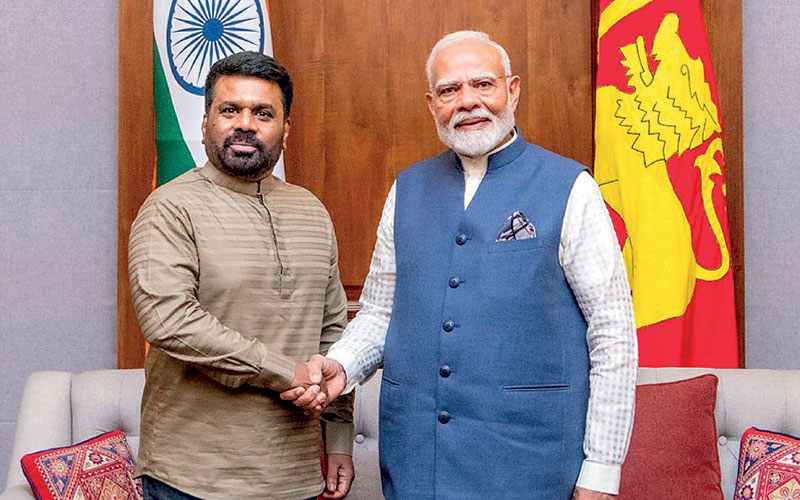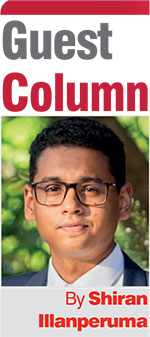Tuesday Feb 17, 2026
Tuesday Feb 17, 2026
Saturday, 14 June 2025 00:00 - - {{hitsCtrl.values.hits}}

As the centre of gravity of the global economy shifts towards Asia, it is natural for smaller states like Sri Lanka to drift in that direction in search of opportunities
 To give credit where it is due – to the executive as well as the judicial branches of government – corrupt politicos at the upper echelon level are being handed stiff sentences in gaol for the first time since ‘good governance’ put the idea in our heads that crime deserves punishment no matter who or how well connected you are. And that justice must not only be done but be seen to be done, and so introduced the constitutional amendments that empowered the process of holding elected representatives and appointed officials transparently accountable for their deeds
To give credit where it is due – to the executive as well as the judicial branches of government – corrupt politicos at the upper echelon level are being handed stiff sentences in gaol for the first time since ‘good governance’ put the idea in our heads that crime deserves punishment no matter who or how well connected you are. And that justice must not only be done but be seen to be done, and so introduced the constitutional amendments that empowered the process of holding elected representatives and appointed officials transparently accountable for their deeds
 Since Sri Lankan President Anura Kumara Dissanayake was elected in September 2024, he has made four state visits. First to India, then to China, the United Arab Emirates (UAE), and Vietnam. This itinerary says a lot about the state of the international economy and debt-saddled Sri Lanka’s options within it.
Since Sri Lankan President Anura Kumara Dissanayake was elected in September 2024, he has made four state visits. First to India, then to China, the United Arab Emirates (UAE), and Vietnam. This itinerary says a lot about the state of the international economy and debt-saddled Sri Lanka’s options within it.
Two of these countries, India and China, were founding members of the BRICS formation in 2009. The UAE officially joined BRICS in 2024, and Vietnam was invited to become a partner country in the same year. These countries are engines of growth in the international economy. Having begun to reshape the international division of labour, they are slowly trying to reshape its institutional superstructure.
The absence of certain countries on Dissanayake’s itinerary is also telling – there were no G7 countries on the agenda. The US and the European Union account for over 50% of Sri Lanka’s exports, but protectionism, declining consumer confidence, and a lack of real investments compel Sri Lanka to turn to the South for its development.
Bending with the wind
In 1967, Singaporean President Lee Kuan Yew noted that in many newly independent states, the ‘will to resist’ often melts in the face of hard power. However, many of these states would also ‘bend with the wind like the bamboo… if it looks like the east wind is bending stronger than the west wind, then people start bending that way even before the wind comes’.
Yew was talking about Southeast Asia during the Cold War, but his words could very well apply to countries like Sri Lanka in today’s New Cold War. Sri Lanka’s current engagement with actors in the Global South is characterised much more by material interests than by the high ideals of the Bandung Spirit. The country’s economy remains weak after defaulting on its external debt in 2022. The manufacturing sector is stagnant, and foreign investors have been downsizing. Having capitulated to the IMF programme that his party campaigned to renegotiate, the president now keeps repeating that there is no real economic sovereignty. With foreign exchange reserves scarce and fiscal and monetary powers curtailed, the government has been seeking external sources for investment so that the economy can grow.
In Beijing, fifteen MOUs were signed. One of these includes a long-mooted $3.2 billion investment from Chinese state-owned enterprise Sinopec for an oil refinery in the southern port of Hambantota. If it materialises, the investment would be Sinopec’s first overseas refinery, creating opportunities for several downstream chemical industries and supplying the country with an affordable source of energy (Sri Lanka currently imports most of its required fuel from refineries in Singapore).
In New Delhi, a number of MOUs were signed, including for projects in housing, renewable energy, and civil service capacity building. A few months later, when Indian Prime Minister Narendra Modi visited Sri Lanka, seven more MOUs were signed. One of these was a trilateral agreement including the UAE to develop an energy logistics hub in Sri Lanka’s eastern city of Trincomalee. While not much is known about the deal, Trincomalee is geopolitically significant because it is home to a World War II-era oil tank farm and one of the best natural harbours in the world.
In Dubai, an agreement was made to facilitate investment between the two countries, and a joint business council was established. In Hanoi, four MOUs were signed, including on cooperation in machinery and equipment manufacturing, agriculture, and trade. While in Hanoi, Dissanayake also invited the private Vietnamese conglomerate Vingroup to invest in Sri Lanka’s real estate and tourism sectors.
The current Sri Lankan government remains much more conservative when it comes to broader political and moral questions, such as the ongoing Israeli genocide in Gaza, which the Global North has been backing through the provision of arms and ammunition. Israeli tourists, including former IOF soldiers, have flooded the country since 2023, often coming into conflict with locals due to their operation of illegal businesses, setting up of unauthorised places of worship, and generally racist and aggressive behaviour. The government continues to send migrant workers to Israel and has been discussing agricultural cooperation.
In a Nakba commemoration event held recently in Colombo, the government was questioned as to why it would not sever ties with Israel. Minister of Transport Bimal Rathnayake, who is also a co-chairperson of the Sri Lanka Committee for Solidarity with Palestine, responded: ‘If Sri Lanka suddenly ends ties with Israel, the economy will crash... Sri Lanka will act like several countries, including Saudi Arabia, China, and Russia, who stand with Palestine but continue ties with Israel for diplomatic and economic purposes’.
The unbroken impasse
South-South economic cooperation offers the possibility of a break from a Global North-dominated economic order. However, contradictions among states in the Global South create problems. For example, many Sri Lankans feel as if the country is being divided, with territory in the north and east often allocated for Indian investment while territory in the south is mainly for Chinese investment, mirroring differences in the country’s ethnic demographics. Moreover, the substitution of southern capital over northern capital doesn’t resolve questions over the extent to which such investments are consultative, ecologically sustainable, and protective of sovereignty. For example, a proposal to link Sri Lanka’s electricity grid to India has become a major catalyst for conversations about economic sovereignty.
As the centre of gravity of the global economy shifts towards Asia, it is natural for smaller states like Sri Lanka to drift in that direction in search of opportunities. Actors in the Global South can provide the objective factors needed for development: capital, technology, and markets. However, they cannot intervene in domestic social processes to create the subjective conditions needed for socioeconomic transformation. The latter requires initiative from local actors, the lack of which reflects either a deficit of political will or, worse, a deficit of political confidence in a programme that can transcend neoliberalism.
There remains the hard work of challenging the rentier and comprador segments of society at home. Many of the existing merchant capital interests that have dominated the economy since colonial times also ‘bend with the wind’ without fundamentally changing the pattern of underdevelopment. Old trading companies now import Indian and Chinese goods rather than British, German, or Japanese goods. When it comes to the kinds of concrete reforms needed at home, two examples are worth discussing: agrarian reform and financial reform.
Sri Lanka has one of the lowest ratios of arable land per capita in Asia at 0.06 hectares per capita, compared to China’s 0.08 hectares and India’s 0.11. This problem is amplified by the fact that a significant portion of this land is used for cash crops, making the country extremely vulnerable to food crises. Sri Lanka does not have a policy for the rational use of land to ensure food sovereignty and environmental sustainability. Monopoly interests exist at every level of the agricultural sector, from the provision of credit, seeds, and fertilisers to the processing, storage, transport, and marketing of the finished product.
Sri Lanka is also one of the few countries in Asia without a real state-owned development bank. Two of Sri Lanka’s development banks were privatised in the 1990s and now operate on a commercial basis. Most private commercial banks are risk-averse and channel credit towards unproductive sectors such as trade and consumption. Therefore, there is a scarcity of affordable long-term credit for productive activity in agriculture and manufacturing. While a development bank has long been mooted, including by the first budget of the present government, questions remain about finding the capital for such a bank.
Finally, there is the challenge of overall coherence. For real socioeconomic transformation to take place, piecemeal investments from various bilateral partners have to add up to an integrated and interconnected whole. It is not clear that such a plan exists given the deterioration of state capacity in the neoliberal era. Ultimately, the problem of underdevelopment is not only a lack of resources but an impasse in social relations which prevents further development of the productive forces.
(This article was produced by Globetrotter. The writer is a Sri Lankan journalist and political economist. He is a researcher at Tricontinental: Institute for Social Research and a co-editor of Wenhua Zongheng: A Journal of Contemporary Chinese Thought.)